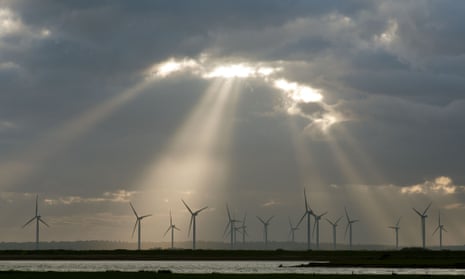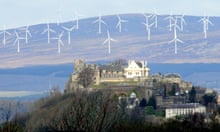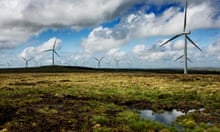Sam Laidlaw, the chief executive of Centrica, has urged the government to reconsider its support for offshore wind and other costly low-carbon technologies because it will raise the cost for energy consumers at a time of lower wholesale power prices.
The energy boss and former government adviser also attacked ministers for allowing energy companies to propose coal-fired power stations for a new subsidy scheme when Britain was trying to cut carbon emissions.
Laidlaw said he did not know whether the recent collapse in oil and gas prices would last long, but pointed out that the Department of Energy and Climate Change (DECC) has revised down its own estimate of electricity prices over the rest of this decade by up to 20%.
“Energy consumers will be puzzled to learn that they are unlikely to enjoy the benefit of those lower power prices. That’s because of the choices made by successive UK governments about which renewable and low-carbon technologies to prioritise and how to incentivise them.”
He argued that householders effectively will pay £140 per MW hour by 2018 to pay for offshore wind when the expected wholesale price for power is now expected to be a little more than £50.
“By the end of this decade, under current plans, we’ll be spending £7.6bn a year through the levy control [subsidy] framework, much of it to support wind turbines that have not come down in cost,” the Centrica boss told an FT gas conference in London on the same day German utility RWE blamed timing problems for scrapping plans to develop the huge Galloper windfarm off East Anglia. Centrica, the owner of British Gas, has already stopped building new offshore windfarms.
The questioning of offshore wind costs follows the Conservative party pledge to end future onshore wind subsidies. However, both have been championed by Ed Davey, the Liberal Democrat DECC secretary of state. Davey believes the subsidies offer a vital hedge against rising power prices long into the next decade but that coal, gas and nuclear all need to be incentivised to keep the lights on in the meantime.
Laidlaw, a former member of the prime minister’s Business Advisory Group, said it was “paradoxical” to give subsidies to carbon-intensive coal plants on one hand and operate a carbon price floor designed to drive out this kind of fossil fuel.
The so-called Capacity Mechanism auction planned for December was aimed at providing back-up generation for intermittent renewable sources such as wind, said the Centrica boss. “The expectation was that this would incentivise the building of new gas-fired power stations. But look through the pre-qualification lists published a few weeks ago and it is clear that old, dirty coal stations will be paid extra to stay online for longer.
“The cost of this will be levied on customers’ bills, alongside the cost of the carbon price floor, which is designed to encourage switching away from coal. There’s an inherent paradox here.”
The DECC denied being contradictory. “There is no paradox. The carbon price floor and the capacity market [subsidy scheme] work together to ensure we move to low-carbon generation in a way that keeps the lights on at peak demand at lowest cost to the consumer.
“The carbon price floor [CPF] is designed to provide greater support and certainty to the price of carbon in the UK’s electricity generation market. Effective carbon pricing, including the CPF, remains an important part of the government’s energy policy. Establishing a minimum carbon price sends a credible signal to help drive billions of pounds of investment in low-carbon technology.”
The concerns about coal-fired power stations were seized upon by Greenpeace which estimated that coal plant operators could receive up to £2.2bn in the Capacity Market auction scheduled for December. The environmental group described Laidlaw’s analysis as a “naked-emperor moment” for government coal policy.
Lawrence Carter, a Greenpeace energy campaigner, added: “The most influential energy boss in the country is now confirming what Greenpeace and others have been warning all along. A big chunk of these new energy handouts will be pocketed by coal plant operators and used to extend the lifespan of some of Europe’s most polluting power stations.”
Laidlaw, who retires from the company at the end of the year, also called on government to be more honest with the public about the challenges as the UK tried to maintain energy capacity while also trying to fight climate change.
“So how do we get to a sustainable energy policy? Above all we must be straight with the public and honest about the costs. There is no magic bullet.”







Comments (…)
Sign in or create your Guardian account to join the discussion